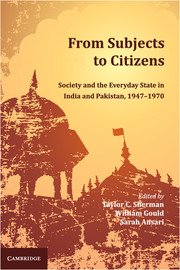Book contents
- Frontmatter
- Contents
- Acknowledgements
- Introduction
- 1 Personal Law and Citizenship in India's Transition to Independence
- 2 From Subjects to Citizens? Rationing, Refugees and the Publicity of Corruption over Independece in UP
- 3 Performing Peace: Gandhi's Assassination as a Critical Moment in the Consolidation of the Nehruvian State
- 4 Migration, Citizenship and Belonging in Hyderabad (Deccan), 1946–1956
- 5 Punjabi Refugees' Rehabilitation and the Indian State: Discourses, Denials and Dissonances
- 6 Sovereignty, Governmentality and Development in Ayub's Pakistan: The Case of Korangi Township
- 7 Everyday Expectations of the State during Pakistan's Early Years: Letters to the Editor, Dawn (Karachi), 1950–1953
- 8 Concrete ‘Progress’: Irrigation, Development and Modernity in Mid-Twentieth Century Sind
- 9 Partition Narratives: Displaced Trauma and Culpability among British Civil Servants in 1940s Punjab
- Contributors
- Index
4 - Migration, Citizenship and Belonging in Hyderabad (Deccan), 1946–1956
Published online by Cambridge University Press: 05 February 2014
- Frontmatter
- Contents
- Acknowledgements
- Introduction
- 1 Personal Law and Citizenship in India's Transition to Independence
- 2 From Subjects to Citizens? Rationing, Refugees and the Publicity of Corruption over Independece in UP
- 3 Performing Peace: Gandhi's Assassination as a Critical Moment in the Consolidation of the Nehruvian State
- 4 Migration, Citizenship and Belonging in Hyderabad (Deccan), 1946–1956
- 5 Punjabi Refugees' Rehabilitation and the Indian State: Discourses, Denials and Dissonances
- 6 Sovereignty, Governmentality and Development in Ayub's Pakistan: The Case of Korangi Township
- 7 Everyday Expectations of the State during Pakistan's Early Years: Letters to the Editor, Dawn (Karachi), 1950–1953
- 8 Concrete ‘Progress’: Irrigation, Development and Modernity in Mid-Twentieth Century Sind
- 9 Partition Narratives: Displaced Trauma and Culpability among British Civil Servants in 1940s Punjab
- Contributors
- Index
Summary
Introduction
The middle of the twentieth century witnessed a transition from an era which was characterized by the relatively free movement of people within the British Empire to a period in which postcolonial nation-states attempted to control flows of migrants more closely. This change left migrants across the former British Empire in an anomalous and often disadvantaged position: Indians in South Africa had limited political rights; the bulk of Indians in Ceylon acquired the nationality of neither India nor Ceylon; Indians resident in Burma who did not wish to become Burmese citizens after independence there were made to register and apply for permits to stay; South Asians in Malaya who left the country after independence in 1957 risked being refused re-entry. At some point in the early postcolonial period many of these countries experienced what might be called a crisis of citizenship, in which the breaking of imperial bonds of migration, trade and finance was proffered as the solution to a wide variety of postcolonial ills. Thus, General Ne Win put pressure on Indians to leave Burma in 1962, Kenya placed restrictions on the rights of Indians in the late 1960s, and Idi Amin expelled Asians from Uganda in 1972. Much less is known, however, about the fortunes of people of non-Indian origin in India. The following pages track the fate of Arabs, Afghans and other groups of Muslim migrants in Hyderabad after this princely state was forcibly integrated into the Indian Union in September 1948.
- Type
- Chapter
- Information
- From Subjects to CitizensSociety and the Everyday State in India and Pakistan, 1947–1970, pp. 90 - 118Publisher: Cambridge University PressPrint publication year: 2014
- 3
- Cited by



